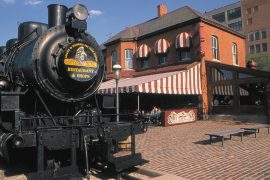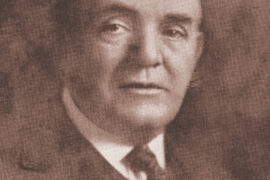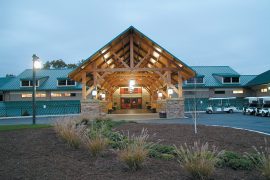One of our city’s pioneers
By James E. Casto
HQ 62 | SUMMER 2007
Sam Gideon (1836-1923) was one of Huntington’s earliest merchants and most prominent citizens. “Uncle Sam,” as he was known to his many customers and friends, was short in stature – standing only 5 feet, 7 inches, tall – but nevertheless cast a huge shadow over the young city’s daily affairs.
Born at Württemberg in Germany, Gideon came to this country in 1854 without a penny to his name. Even though he knew only a few words of English, he somehow managed to make his way to Rock Island, Illinois, where a family friend took him in.
While in Illinois, Gideon was in the audience for one of the famed 1858 debates between Abraham Lincoln (a Republican) and Stephen A. Douglas (a Democrat) who were battling each other for an Illinois seat in the U.S. Senate. At that time, the state legislatures elected Senators. The debates presaged Lincoln’s successful 1860 presidential campaign and are remembered for the considerable eloquence with which both men presented their arguments. Practically the only issue discussed was slavery.
Gideon became an ardant Lincoln supporter. When the Confederates fired on Fort Sumter and Lincoln called for volunteers to suppress the rebellion, he was one of the first to answer the president’s call. Enlisting in the 27th Illinois Volunteer Infantry, Gideon served in the Union Army for three years and fought in a number of major battles, including Chickamauga. He emerged from the war as a lieutenant.
At the war’s end, Gideon moved to Cincinnati, Ohio, where, in 1865, he married Dora Epopinger. Like her husband, she had come to this country from Germany. The young couple moved from Cincinnati to Manchester and then, in 1872, to Huntington, where they would live for the rest of their lives.
Within a month of his arrival in Huntington, Gideon opened a clothing store at 949 3rd Avenue. The store would be a busy part of the city’s retail scene for more than 50 years. Initially, Gideon and his wife lived upstairs over the store, but later they moved to a home in the 400 block of 13th Avenue on the city’s South Side.
Gideon’s first foray into local politics came in 1876 when he won election to Huntington City Council. Four years later, he unsuccessfully ran for mayor against Dr. E.S. Buffington, a son of the city’s first mayor, Peter Cline Buffington. Gideon was re-elected to council in 1886 and the next year played a major role in establishing the city’s first water system.
A member of the Huntington Board of Education for nearly 25 years, Gideon also served on the Cabell County Court and was president of the court when the courthouse was completed in 1901.
Gideon helped found the first Jewish congregation in Huntington, was one of the organizers of the local Odd Fellows Lodge and served as commander of the Huntington post of the Grand Army of the Republic, the organization of Union Army veterans.
With the death of his wife early in 1923, Gideon’s health began to fail and he died four months later, on June 20 of that year. Describing his funeral, The Herald-Dispatch wrote: “Hundreds of Huntington’s most prominent men and women mingled with men and women of all classes, races and religious beliefs to pay tribute to one of the city’s pioneers.”
Rabbi A. Feinstein, who conducted the services, labeled Gideon a “saint.”
“Judaism does not worship saints but it reveres and loves them,” the rabbi told the assembled mourners. “Such a man was the late Sam Gideon. We are met here to revere the memory of a saint. Everyone knew Sam as one of the best citizens in the community and everyone recognized in him only the best.”
In 1928, the Cabell County Court honored Gideon by naming one of the county’s magisterial districts after him.
Sam and Dora Gideon had six children. Their oldest son, Dave (1873-1950), would, like his father, play an out-sized role in the city’s affairs. Born upstairs over the family clothing store, Dave would go on to become a clerk in the store and later his father’s partner. After his father’s death he sold the business.
In 1913, Dave bought a part interest in The Herald-Dispatch and in 1920 was named the newspaper’s publisher. Later, the Huntington Advertiser and The Herald-Dispatch merged to form the Huntington Publishing Company, and in 1936, he became president of the merged company, a position he held until his death.
Active behind the scenes in Republican politics for many years, Dave Gideon served as a respected informal adviser too many political figures on the local, state and national levels.





